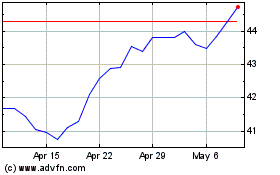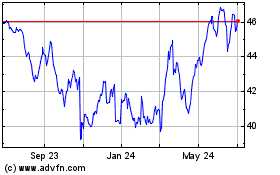E-cigarette maker alienated regulators, helping create a crisis
that imperils its future
By Jennifer Maloney and Stephanie Armour
This article is being republished as part of our daily
reproduction of WSJ.com articles that also appeared in the U.S.
print edition of The Wall Street Journal (September 23, 2019).
Juul Labs Inc. pursued a strategy to win over Washington. But
the e-cigarette maker wound up further alienating regulators,
helping to thrust the once-soaring startup into a crisis that
threatens its business.
Facing scrutiny stemming from surging teen use of its
vaporizers, Juul has tried over the past year to position itself as
a responsible actor in an industry with few rules. It overhauled
its marketing, halted retail-store sales of its fruity flavors that
young people favor and introduced a checkout system to curb illegal
sales to minors.
But other steps it took backfired and contributed to a
perception in Washington that Juul was on the wrong side of a
public health crisis.
"I think Juul put the entire category at risk by pursuing
top-line growth and market share without a real eye toward what was
going on and who was using them," said Scott Gottlieb, who as
federal Food and Drug Administration commissioner clashed with the
startup last year.
The company flooded the White House with lobbyists and other
advocates, making it appear that it was bypassing the FDA, which
irked officials in the agency and some in the administration,
according to people familiar with the discussions.
Juul launched an anti-vaping program for schools despite
warnings that the effort was reminiscent of one by major tobacco
companies years ago that seemed aimed more at luring new smokers
than dissuading them. And it made unauthorized claims to children
and adults that its products were safer than cigarettes, the FDA
concluded, prompting a formal rebuke from the agency.
Juul has said it never targeted underage users, that its
youth-prevention program was intended to help stop young people
from vaping and that it ended that program after receiving
feedback.
"We strongly agree with the need for aggressive category-wide
action to combat youth usage," a Juul spokesman said, adding that
the company would continue to work to curb teen vaping "while
supporting reasonable access" for adult cigarette smokers looking
to switch.
The Trump administration this month said it planned to ban most
vaping products from the market, leaving just those formulated to
taste like tobacco. That would wipe out products that account for
more than 80% of Juul's U.S. sales, which had been on track to
exceed $2 billion this year.
Subsequent developments tightened the vise. Two Chinese
e-commerce websites stopped selling Juul's products without
explanation. India banned e-cigarettes entirely. And on Friday,
Walmart Inc. said it would stop selling vaping products in all of
its U.S. stores.
With just two to three months before the proposed federal ban
would take effect, Juul executives are deliberating a critical
decision: whether to lobby for a less-comprehensive ban that allows
mint and menthol refill pods to remain on the market as an
alternative for smokers of menthol cigarettes. The carve-out would
preserve what has become the majority of Juul's business since it
stopped selling flavors like mango and cucumber in stores.
But mounting a fight would pit Juul against a rising anti-vaping
tide fueled by a mysterious vaping-related lung illness that has
caused eight deaths and sickened hundreds of people. Juul hasn't
been linked to the deaths.
Though the ban would be crippling in the near term, Juul
officials believe the new policy could help curb underage vaping,
shake out potentially hazardous copycat products and avert an even
bigger threat: the possibility that the FDA could take Juul's
products off the market altogether.
Regulators started closing in on Juul in April 2018, when the
FDA launched an investigation as parents and school administrators
raised the alarm about teenagers vaping. With its products and
marketing suddenly under the microscope, Juul launched a
political-action committee, opened a Washington office and began
amassing lobbyists.
Juul last year developed an anti-vaping program to be presented
in elementary and high schools. But an executive inside Juul and
public health experts raised concerns that the program was "eerily
similar" to youth-prevention tactics used by R.J. Reynolds and
Philip Morris in the 1980s and 1990s, according to a person
familiar with the matter and internal documents published by a
congressional subcommittee.
In June 2018, the executive, Julie Henderson, director of Juul's
youth prevention program, pointed to research showing those
initiatives -- which distributed materials about the hazards of
smoking to young people at amusement parks, video arcades, schools,
camps and elsewhere -- did nothing to curb underage smoking and in
fact helped the tobacco industry.
Nevertheless, Juul that summer paid $134,000 to fund a "healthy
life adventures" program for students from third to 12th grades at
a Baltimore charter school. Ms. Henderson couldn't be reached for
comment.
Two teenagers testified at a July congressional hearing about
Juul's school programs. The students said that a Juul
representative at their high school told them that the company's
e-cigarettes were "99% safer than cigarettes."
In September, Mitch Zeller, director of the FDA's Center for
Tobacco Products, wrote in a letter to Juul's chief executive that
he was troubled by the testimony. "Juul engaged in a wide variety
of promotional activities and outreach efforts to persuade
potential customers, including youth, to use Juul products," Mr.
Zeller wrote in the letter, which the FDA published.
In September 2018, the FDA received data from a federal survey
confirming that vaping among high-school students had climbed. Dr.
Gottlieb, then the agency's commissioner, declared it an epidemic
and threatened to take flavored e-cigarettes off the market if the
manufacturers didn't act quickly to curb youth use.
Juul stopped selling in retail stores all of its flavors except
for tobacco, mint and menthol, though it continued to sell other
flavors on its website, which has age controls. It also shut its
U.S. Facebook and Instagram accounts.
In December 2018, regulators were taken by surprise when
Marlboro maker Altria Group Inc. struck a deal to invest $12.8
billion for a 35% stake in Juul. FDA officials felt that the deal
-- in which Altria agreed to give Juul shelf space and insert Juul
coupons in cigarette packs -- contradicted statements both
companies had made in private meetings with the FDA, according to
letters the FDA released from Dr. Gottlieb to the companies'
CEOs.
Facing an irate regulator, Juul ramped up its lobbying campaign,
taking its message directly and repeatedly to the White House.
By then, Juul lobbyists were able to secure meetings with top
White House officials. Two people familiar with the discussions
used the word "unprecedented" to describe the scale of the
company's presence in the West Wing. In a meeting with officials
from Juul and Altria, Dr. Gottlieb voiced his displeasure at their
White House lobbying, peope familiar with the matter said.
A senior administration official said Juul's lobbying didn't
stand out as excessive or heavy.
Altria and Juul both have said they shared the FDA's concerns
about youth vaping, embraced its 2018 proposal to restrict sales of
sweet and fruit-flavored e-cigarettes and supported federal
legislation to raise the minimum purchase age to 21.
In August, the FDA received a new set of data. While cigarette
smoking had dropped among teens, nearly 28% of high school students
said they had used an e-cigarette at least once in the past 30
days, up from 21% a year earlier. The figures also showed a jump in
teen use of mint- and menthol-flavored e-cigarettes.
Alex Azar, the secretary of Health and Human Services, took the
data to the White House. White House advisers, who had been mulling
a ban for weeks in advance of the data's arrival, now pushed for
it, including a halt to the sales of mint and menthol flavors.
Although President Trump had been briefed on the idea by Mr.
Azar, he didn't appear to fully engage on it until Melania Trump
got involved, a senior White House official said.
Write to Jennifer Maloney at jennifer.maloney@wsj.com and
Stephanie Armour at stephanie.armour@wsj.com
(END) Dow Jones Newswires
September 23, 2019 02:47 ET (06:47 GMT)
Copyright (c) 2019 Dow Jones & Company, Inc.
Altria (NYSE:MO)
Historical Stock Chart
From Mar 2024 to Apr 2024

Altria (NYSE:MO)
Historical Stock Chart
From Apr 2023 to Apr 2024
